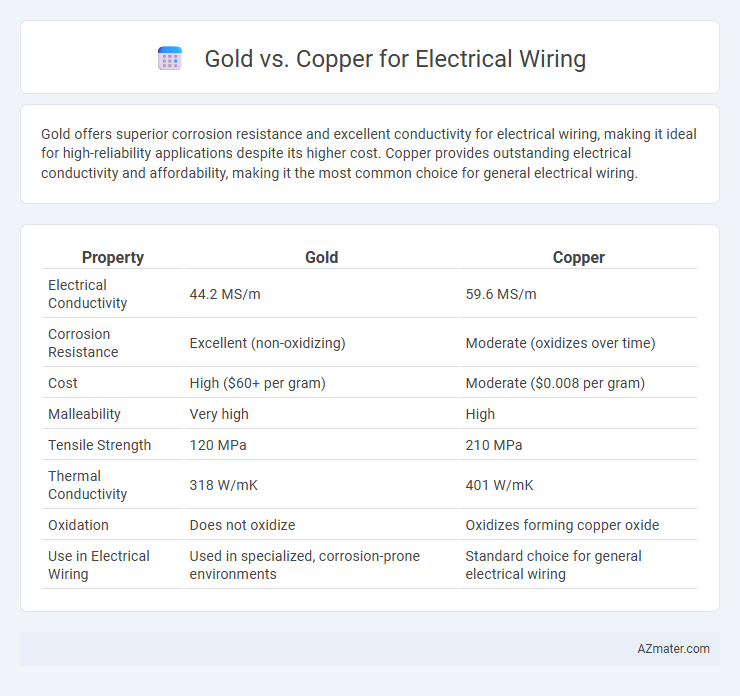Gold offers superior corrosion resistance and excellent conductivity for electrical wiring, making it ideal for high-reliability applications despite its higher cost. Copper provides outstanding electrical conductivity and affordability, making it the most common choice for general electrical wiring.
Table of Comparison
| Property | Gold | Copper |
|---|---|---|
| Electrical Conductivity | 44.2 MS/m | 59.6 MS/m |
| Corrosion Resistance | Excellent (non-oxidizing) | Moderate (oxidizes over time) |
| Cost | High ($60+ per gram) | Moderate ($0.008 per gram) |
| Malleability | Very high | High |
| Tensile Strength | 120 MPa | 210 MPa |
| Thermal Conductivity | 318 W/mK | 401 W/mK |
| Oxidation | Does not oxidize | Oxidizes forming copper oxide |
| Use in Electrical Wiring | Used in specialized, corrosion-prone environments | Standard choice for general electrical wiring |
Introduction to Electrical Wiring Materials
Gold and copper are both highly conductive metals used in electrical wiring, but copper is far more common due to its excellent conductivity, affordability, and mechanical strength. Gold offers superior corrosion resistance and reliable conductivity in harsh environments, making it ideal for specialized applications like high-performance connectors and aerospace wiring. Copper's widespread availability and efficiency make it the standard choice for residential, commercial, and industrial electrical systems.
Overview of Gold and Copper Properties
Gold exhibits excellent electrical conductivity, corrosion resistance, and malleability, making it ideal for high-reliability electrical connections in sensitive electronics. Copper, renowned for its superior conductivity and affordability, is widely used in electrical wiring for residential and industrial applications despite being more prone to oxidation. The choice between gold and copper depends on balancing factors like conductivity, durability, cost, and environmental conditions.
Electrical Conductivity: Gold vs Copper
Copper has an electrical conductivity of approximately 5.96 x 10^7 S/m, making it one of the best conductors widely used in electrical wiring due to its efficiency and cost-effectiveness. Gold's electrical conductivity is slightly lower, around 4.10 x 10^7 S/m, but it is highly resistant to corrosion and oxidation, which preserves its conductive properties over time. Despite copper's superior conductivity, gold is preferred in specialized applications such as high-reliability connectors and contacts where durability and long-term performance are critical.
Corrosion Resistance and Durability
Gold exhibits superior corrosion resistance compared to copper, maintaining consistent conductivity in harsh environments due to its inert nature. Copper, while highly conductive and durable, is prone to oxidation and corrosion, which can degrade electrical connections over time. The enhanced durability of gold minimizes maintenance needs and prolongs lifespan in critical electrical wiring applications, especially where exposure to moisture or chemicals is common.
Thermal Conductivity Comparisons
Gold offers superior corrosion resistance but has lower thermal conductivity (approximately 318 W/m*K) compared to copper's high thermal conductivity of about 401 W/m*K, making copper more efficient for heat dissipation in electrical wiring. Copper's excellent thermal conductivity allows for better heat transfer, reducing the risk of overheating and ensuring stable electrical performance. While gold's conductivity is sufficient for specialized applications, copper remains the preferred choice in most wiring due to its balanced electrical and thermal properties.
Cost Analysis: Gold vs Copper Wiring
Copper wiring remains the most cost-effective choice for electrical installations due to its abundant availability and lower price per kilogram compared to gold, which is significantly more expensive. Gold offers superior corrosion resistance and conductivity, but its high market value makes it impractical for large-scale wiring projects. Evaluating total installation costs, copper provides an optimal balance of performance and affordability for most residential and commercial applications.
Mechanical Strength and Flexibility
Gold offers superior corrosion resistance and excellent electrical conductivity but has lower mechanical strength compared to copper, making it less suitable for load-bearing applications. Copper exhibits higher tensile strength and greater flexibility, which allows it to withstand bending and mechanical stress without breaking, ideal for most electrical wiring uses. The mechanical durability of copper and its ability to endure repetitive flexing make it the preferred choice in residential and industrial electrical systems.
Common Applications in Electrical Systems
Gold is commonly used in high-reliability electrical connectors and circuit boards due to its excellent corrosion resistance and superior conductivity, ensuring stable signal transmission in critical systems. Copper dominates general electrical wiring applications, such as residential and commercial building wiring, power generation, and transmission systems, owing to its high electrical conductivity and cost-effectiveness. Specialized environments requiring long-term durability and minimal signal loss typically favor gold, while copper remains the standard for most electrical infrastructure due to its balance of performance and affordability.
Environmental Impact and Sustainability
Gold exhibits superior corrosion resistance and long-term durability in electrical wiring, reducing waste and replacement frequency, thus contributing to environmental sustainability. Copper, while more abundant and highly conductive, involves intensive mining processes that generate significant environmental degradation and energy consumption. Choosing gold over copper can minimize the ecological footprint through enhanced lifespan and recyclability despite higher initial material costs.
Conclusion: Choosing the Right Material
Gold offers superior corrosion resistance and excellent conductivity, making it ideal for critical electronics and high-reliability applications despite higher costs. Copper provides strong conductivity at a significantly lower price, making it the preferred choice for most residential and commercial electrical wiring projects. Selecting between gold and copper depends on the balance between budget constraints and performance requirements in specific electrical systems.

Infographic: Gold vs Copper for Electrical Wiring
 azmater.com
azmater.com